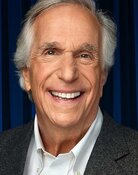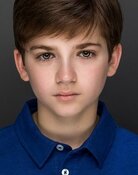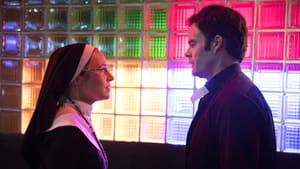Barry
Chapter Two: Use It
Season: 1
Episode: 2
Air date: 2018-04-01
Guest stars: D'Arcy Carden,Darrell Britt-Gibson,Rightor Doyle,Michael Bofshever,Alejandro Furth,Kirby Howell-Baptiste,John Pirruccello,Andy Carey,Izzy Diaz,Mark Ivanir,Cameron Britton,Sergey Brusilovsky,Irina Dubova,Gerald Webb
In the wake of shocking news, Gene encourages his students to channel their feelings into their work. Resolved to quit his job and put the past behind him, Barry tries not to get pulled back in by Fuches and the Chechens. Sally tries to crack the nut that is Barry.
“These feelings that you're having right now, these are the paints in your acting toolbox... It's called ‘being human.’ That's what acting is.” – Sally Reed
Alright, I’ll admit it—after feeling pretty tepid about the series pilot, this second episode does start warming me up to
Barry. Not a full 180, but enough to make me sit up and stop checking how much time is left. It finally feels like the show’s getting a grip on its tone, which—let’s be honest—isn’t an easy ask when you’re juggling murder, acting classes, mafia threats, and a lead who stares into emotional trauma like it’s a math problem he forgot how to solve.
What works here, and what feels sharper than the pilot, is the show’s unflinching dive into
performance. Not just the theatrical kind—the
emotional performance everyone does to make sense of their lives, their image, their grief, and their relationships. Whether it’s the acting class students transforming a memorial into an unsolicited talent show, or the Chechens leaning into cartoon villain theatrics (complete with aprons and dramatic monologues), the episode is constantly playing with what’s real and what’s just someone’s idea of “how you’re supposed to feel.” As someone who's been around creative circles (joined an acting class once, but my experience stemmed mostly from my scriptwriting class), I could tell you that creatives can be about as phony as they come, on or off-screen, so this episode at least nailed that right.
And then there’s Sally, whose character might very well have coined the term of “Nice Girl™”. I’ve met her. You’ve met her. Anyone who’s spent time around the arts—or frankly, just the kind of social scene that thrives on performative empathy—knows this type. She talks like a beacon of emotional intelligence but steamrolls others, centers herself in every shared experience, and still manages to act surprised when people don't meet her halfway. Even in grief, she manages to curate the
aesthetic of caring while maintaining center stage. Many actors can come off as narcissistic, but right from the pilot, I just couldn't feel much connection with her due to how self-entitled she feels like, even with the way she feels disappointed by Barry's lack of interest in sleeping with her. Classic. She’s not evil, not even insincere necessarily—just... curated. And exhausting.
That said, there
is something borderline endearing about her chaotic messiness, especially paired with Barry’s equally fractured emotional interior. If she's a storm of self-importance, he's a void pretending to be a functioning person. Which, surprisingly, makes them kind of a weirdly fitting match. Or at least an interesting disaster waiting to happen.
Speaking of the emotionally voided protagonist, Barry’s arc is the real meat here. He’s the guy trying to learn how to “feel” without realizing he’s been numb for years. The irony is delicious: in a class full of people faking emotion to land roles, Barry is the only one
who literally cannot fake it. The emotions that hit him—the grief, the guilt, the awareness that killing someone actually affects other people—come too late, and too fast. Suddenly, he’s drowning in feelings he doesn’t have the tools to unpack, while Sally stands there offering advice like it’s a TED Talk titled
“So You Accidentally Had a Breakdown.” That disconnect between what Barry wants acting to be (a mask, an escape) and what it actually is (a mirror) is probably the show’s sharpest angle so far.
And honestly, it hits home. As someone who’s been through therapy (in various shapes, forms, and failure rates), the idea of killer using acting as therapy is kind of fascinating (especially when it gives the series a different flavor from something like
Dexter)
. It’s messy and sometimes exploitative, sure, but when it works, it’s like sneaking medicine into your food. The episode touches that nerve without making it too precious, which I appreciate.
Visually, narratively, it’s still a little clunky in parts. Some of the tonal shifts wobble—there’s a brand of humor here that still feels like
SNL writers playing dress-up in an HBO drama. Not always bad, but you can feel the schlocky sketch-show DNA peek through sometimes when the absurdity gets a little too on-the-nose. Still, this episode shows signs of confidence. It’s leaning into its themes. It's not trying to be likable—it’s just being honest. And that’s enough to keep me watching.
“Use It” may not be a perfect episode, but it’s a compelling mess. It finally starts to show what
Barry can be when it digs into the blurred lines between performance and personhood, comedy and crisis. If the pilot felt like a rough draft, this is the first real take.





















